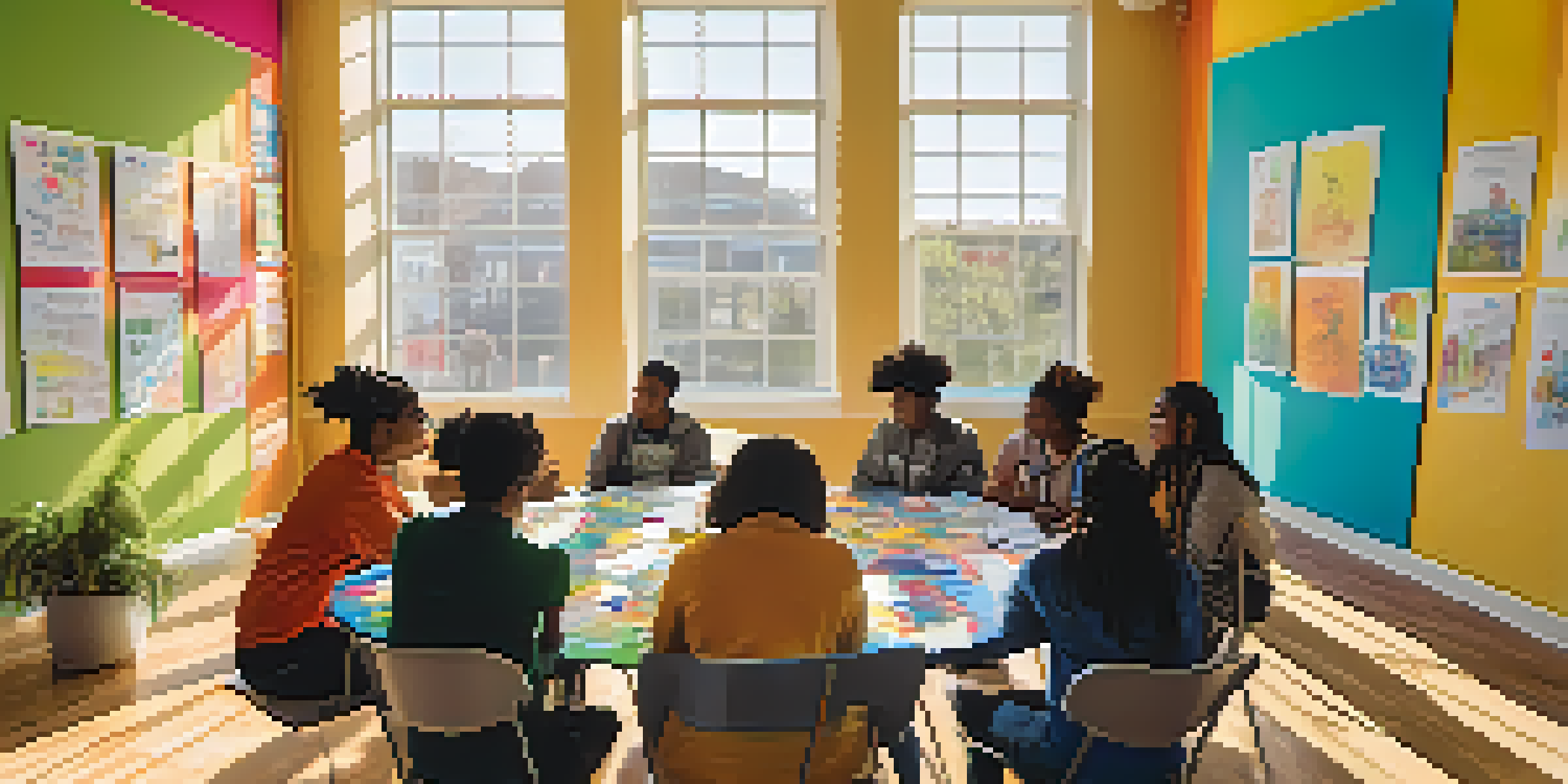Engaging Youth in Mental Health Crisis Management Efforts

Understanding the Importance of Youth Involvement
Engaging youth in mental health crisis management is crucial, as they are often the first responders in their communities. By involving young people, we harness their unique perspectives and innovative ideas, which can lead to more effective solutions. Moreover, youth engagement helps destigmatize mental health issues, making it easier for peers to seek help when needed.
The youth of today are the leaders of tomorrow.
Youth are not just passive recipients of mental health information; they can actively contribute to shaping programs and initiatives. Their involvement can foster a sense of ownership and responsibility, motivating them to advocate for themselves and others. This not only bolsters their confidence but also enhances community resilience during crises.
Incorporating youth voices into mental health strategies ensures that the needs and concerns of this demographic are addressed. By listening to their insights, mental health professionals can create tailored interventions that resonate with young people, ultimately improving outcomes for everyone involved.
Creating Safe Spaces for Open Dialogue
Establishing safe spaces where youth can express their thoughts and feelings without judgment is essential. These environments encourage open dialogue about mental health, allowing young people to share their experiences and concerns. When youth feel safe, they are more likely to engage in discussions that can lead to positive changes in their communities.

Workshops, support groups, and community forums can serve as platforms for these conversations. By facilitating peer-led discussions, we empower youth to take the lead in mental health advocacy. This approach not only nurtures leadership skills but also fosters a sense of belonging and solidarity among participants.
Empower Youth Through Engagement
Involving youth in mental health initiatives leverages their unique insights and fosters ownership, ultimately leading to more effective solutions.
As these safe spaces develop, they can become vital resources for information and support. Young people can learn about coping strategies, available services, and how to advocate for themselves and their peers. This knowledge equips them to navigate mental health challenges more effectively.
Utilizing Technology for Awareness and Support
In this digital age, technology offers innovative ways to engage youth in mental health crisis management. Social media platforms, apps, and online forums can serve as powerful tools for raising awareness and providing support. By leveraging these technologies, we can reach a wider audience and create a community of informed advocates.
Mental health is not a destination, but a process. It's about how you drive, not where you're going.
For instance, mental health apps can offer resources like mood tracking, coping strategies, and direct connections to professionals. These tools empower youth to take charge of their mental health while also connecting them with peers facing similar challenges. Technology thus becomes a bridge between youth and the support they need.
Moreover, online campaigns can raise awareness about mental health issues and reduce stigma. Young influencers can share their stories and encourage others to speak up, creating a ripple effect. When youth see their peers discussing mental health openly, they are more likely to engage and seek help when necessary.
Training Youth as Peer Support Leaders
Training youth as peer support leaders can significantly enhance mental health crisis management efforts. These leaders can provide relatable support to their peers, helping them navigate difficult situations. By receiving proper training, youth can develop the skills needed to recognize signs of distress and offer appropriate assistance.
Peer support programs create a network of young individuals who can share their experiences and coping strategies. This model fosters empathy and understanding, making it easier for youth to approach one another during crises. The shared experience often makes the support feel more genuine and less intimidating than traditional counseling.
Create Safe Spaces for Dialogue
Establishing non-judgmental environments encourages open conversations about mental health, helping youth share experiences and seek support.
Additionally, equipping youth with leadership skills prepares them for future advocacy roles. They learn how to facilitate conversations about mental health, engage their peers, and promote awareness initiatives. This empowerment not only benefits the individual leaders but also strengthens the community as a whole.
Collaborating with Schools for Mental Health Education
Schools play a pivotal role in shaping youth perspectives on mental health. By collaborating with educational institutions, we can integrate mental health education into the curriculum. This ensures that students receive accurate information and learn about coping strategies from an early age.
Workshops and training sessions can be organized within schools to promote mental health awareness. These initiatives can include guest speakers, interactive activities, and the development of mental health clubs. When schools actively engage in mental health education, they create an environment where students feel supported and informed.
Moreover, teachers and staff trained in mental health first aid can better identify and assist students in need. This proactive approach fosters a culture of support and understanding, making it easier for youth to seek help when necessary. Ultimately, a collaborative effort between schools and mental health professionals can create lasting change.
Building Community Partnerships for Broader Impact
Engaging youth in mental health crisis management requires collaboration beyond schools and individual organizations. Community partnerships can amplify efforts and create a more substantial impact. By uniting various stakeholders, including nonprofits, local governments, and businesses, we can create a comprehensive support system for youth.
These partnerships can lead to the development of community-wide initiatives that address mental health issues. Events such as awareness campaigns, mental health fairs, and workshops can be organized collectively, drawing in a larger audience. This not only raises awareness but also fosters a sense of community and shared responsibility.
Collaborate for Greater Impact
Building community partnerships enhances mental health efforts by pooling resources and creating comprehensive support systems for youth.
Moreover, community partnerships can provide valuable resources and funding for mental health programs. By pooling resources, organizations can create more robust support systems and reach more young people in need. This collaborative approach ultimately enhances the overall wellbeing of the community.
Evaluating and Adapting Strategies for Continuous Improvement
To ensure that youth engagement in mental health crisis management remains effective, ongoing evaluation is essential. Collecting feedback from participants can provide valuable insights into what works and what doesn't. This information enables organizations to adapt their strategies and continually improve their programs.
Surveys, focus groups, and interviews can be used to gather feedback from youth about their experiences. Understanding their perspectives allows for the identification of gaps and areas for enhancement. This iterative process ensures that mental health initiatives remain relevant and impactful for young people.

Additionally, sharing successful practices and lessons learned with other organizations fosters a culture of collaboration. By learning from one another, we can collectively elevate mental health support for youth. Continuous improvement ultimately leads to more effective strategies, better outcomes, and stronger communities.